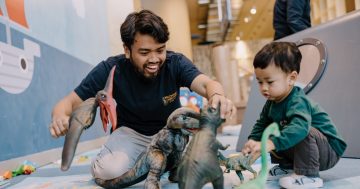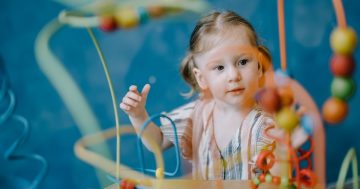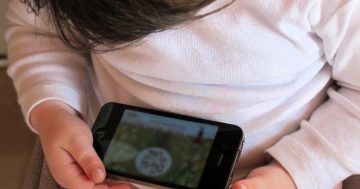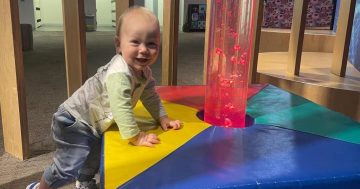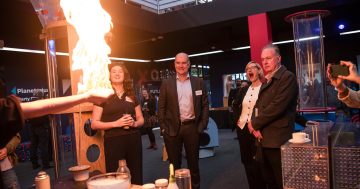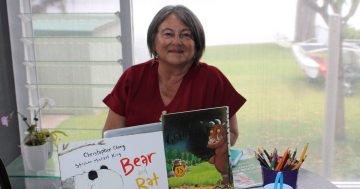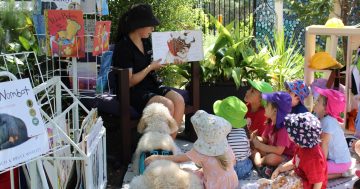
UOW Early Start staff and researchers have noticed an increase in dads taking their kids to the Discovery Space. Photo: UOW.
A 10-week program designed by Wollongong academics will provide the region’s fathers with the skills and confidence to improve their parenting.
The “Dad Space”, which will launch this Friday (25 October) and run weekly until mid-December, will acknowledge the importance of fathers and father figures in children’s lives.
It comes as researchers and professional staff at University of Wollongong’s (UOW) Early Start have noted a steady increase over the past few years of fathers bringing their children along to the Discovery Space, according to Associate Professor Jane Herbert, the Head of Community Partnerships and a researcher within the Interactions and Relationships research focus area of the Early Start Institute.
“We have staff on the floor that are fathers themselves and they’ve had dads come up and start conversations about development, play, what’s normal for their child, sometimes relationships … Complex work home-life questions like how to form a stronger bond with your child when you only have one day a week off work come up fairly often,” she said.
“We can see they want to have those conversations, and they feel this is a safe space where they can ask questions and know the answers will be accurate and informed by research.”
Ass Prof Herbert, who co-designed the Dad Space alongside PhD candidate Amy Hofmeier and Early Start Education Partnership Coordinator Sally Robson and her team, said fathers played a critical role in their children’s development, yet this connection had not received the attention it deserved.
“Studies have highlighted that those children who have engaged, warm fathers have fewer emotional and behavioural problems, are more self-confident and generous, and perform better academically,” she said.
“But fathers and male caregivers often don’t get the same acknowledgment as mothers. While there are often ‘Mummy and me’ programs, and mothers are recognised socially as the default parent, there is little that celebrates the father’s role in the family structure, whatever that family structure looks like.
“There is a lack of social support and resources to help men develop their skills and confidence in parenting.”

Studies show numerous benefits for children with engaged fathers. Photo: UOW.
The Dad Space program will examine the special impact fathers and male caregivers have on children’s development and help them build stronger connections within their families.
Topics will cover building self-confidence in fathers and children, supporting children’s social skills and emotion regulation, strengthening father-child bonds, creating everyday routines, encouraging reading and play and exploring numeracy and financial literacy.
“Financial literacy builds on concepts of numeracy because we know working, earning and using money to buy things are good concepts to learn early on,” Ass Prof Herbert said.
“In today’s society with cards and phones, kids aren’t seeing the interactions with money they had in the past, so have fewer chances to build confidence with numbers and what that means in a real-life environment.”
Education and play partners and UOW academics will run one-hour sessions providing research-based information and hosting interactive activities that can then be extended into the Discovery Space. There will also be tips to use outside the Discovery Space to continue the journey.
In addition to learning from experts in the field, participants can also meet other fathers to share their parenting experiences.
Ms Hofmeier, who is undertaking a PhD in the School of Psychology that focuses on the modern father’s role in early childhood social-emotional development, said the Dad Space would highlight the importance of equity in parental relationships.
“Dads get a bad rap. We hope the Dad Space program will demonstrate that fathers who are present, involved and sensitive can have a positive influence on their children’s social-emotional development,” she said.
“Our goal is to equip fathers with a toolbox of practical strategies they can use to nurture their child’s growth. When we support fathers, we support whole families.”
The Dad Space will run at the Early Start Discovery Space every Friday from 25 October to 13 December. Participation is free for Discovery Space members or included in the price of entry for non-members.









